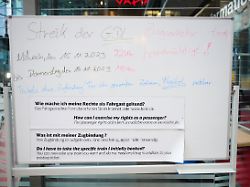First failures in the evening
GDL strike: Not even every fifth train will run
November 15, 2023, 11:56 a.m
Listen to article
This audio version was artificially generated. More info | Send feedback
The train drivers’ union GDL is demanding more salaries and shorter working hours with the same wages. To emphasize their demands, they are calling for a 20-hour strike. Deutsche Bahn expects significant traffic disruptions.
Due to the strike by the GDL train drivers’ union, only one in five trains is expected to run on long-distance services on Thursday. “We expect that less than 20 percent of the ICE and IC trains will run,” said Deutsche Bahn spokesman Achim Stauß in Berlin. Longer trains with more seats would be used. The first trains are likely to be canceled in the evening because otherwise they could get stranded.
“Massive disruptions” are also to be expected in regional traffic, Stauß continued. The effects vary regionally; in some regions “not a single train” is expected to run. Rail freight transport will also be affected. The railway spokesman sharply criticized the GDL: “This is irresponsible and it is happening on the backs of our passengers.” With a view to the next round of negotiations, which was actually agreed for Thursday, Stauß said that a decision as to whether this should actually take place had not yet been made. “But I think it’s completely clear that striking and negotiating at the same time don’t go together.”
GDL boss Weselsky defends warning strike
On Tuesday evening, the GDL called on its members employed by Deutsche Bahn and other railway companies to go on strike for 20 hours. The strike is scheduled to begin at 10 p.m. and end on Thursday evening at 6 p.m. The collective bargaining negotiations between GDL and Deutsche Bahn began last Thursday. The union’s chairman, Claus Weselsky, defended the warning strike immediately before the planned second round of negotiations. The GDL “first had to build up pressure,” said Weselsky on Deutschlandfunk. In this way, the GDL wants to bring about a willingness to negotiate about reducing weekly working hours.
Many collective bargaining negotiations were accompanied by labor disputes, Weselsky continued. This is “completely normal”. The GDL is calling for a wage increase of at least 555 euros for a collective bargaining period of one year, as well as an increase in shift work allowances by 25 percent and a tax-free inflation payment of 3,000 euros. The core concern, however, is a 35-hour week with full wage compensation in a four-day week for employees in shift work.
Deutsche Bahn rejects a reduction in working hours with full pay
The company offers eleven percent more wages and an inflation bonus of up to 2,850 euros for a term of 32 months. The group rejected the reduction in working hours with full wage compensation demanded by the GDL as unachievable. Weselsky said he assumes “that we will also use the negotiation dates to actually reach compromises.” The collective bargaining parties had agreed on four negotiation dates until mid-December.
The GDL boss defended the demand for a 35-hour week with full wage compensation. There was a shortage of workers at Deutsche Bahn, “so we have to make the shift system more attractive.” Weselsky emphasized again that the GDL would not go on strike at Christmas. The GDL has “never” done this, as a “look at history” shows.
